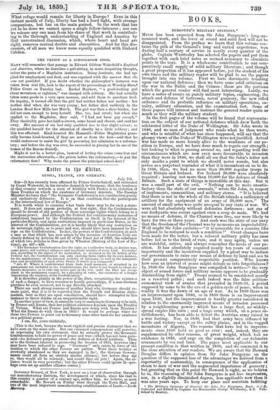THE PRISON AS A SCHOOLROOM DOOR.
MANY will remember that passage in Edward Gibbon Wakefield's England and America, where he describes a girl sitting, in mute despairing thought, before the gates of a Magdalen institution. Being destitute, she had ap- plied for employment and food, and was repulsed with the answer that she was not qualified. If you doubt whether the philosopher's instance was taken from real life, look to the report of the proceedings at Worship Street Police Court on Tuesday last. Rachel Mayhew, " a good-looking girl about seventeen or eighteen," was charged with robbery. She had actually taken some goods in a very open manner, and sold them to purchase food. On inquiry, it turned out that the girl had neither father nor mother : her mother died when she was very young ; her father died suddenly in the London Road Saw Mills last March. The girl was then a shoe-binder, but did not earn enough to keep herself. She, too, had erred ; but when she applied to the Magdalen, they said, " I bad not been gay enough." They charitably gave her half-a-crown, some bread and cheese, and sent her away. Her amount of sin had only qualified her to that slight extent ; so she qualified herself for the attention of charity by a little robbery ; and this was effectual. Kind-hearted Mr. Hammill—Police Magistrates gene- rally become kind-hearted, if they are not so from the first—said that he would endeavour to assist the girl by procuring her admission to a reforma- tory; and before the day was over, he succeeded in placing her in one of the homes of the Rescue Society.
Might it not be a better plan, instead of letting the crime come first and the instruction afterwards,—the prison before the reformatory,—to put the reformatory fast? Why make the prison the principal school door ?


























 Previous page
Previous page